Mark Duggan death: Timeline of events
- Published
Mark Duggan's family win the right to appeal against an inquest's finding that he was lawfully killed by police. Find out about the aftermath of his death in Tottenham.
Here is a timeline of the events that followed Mr Duggan's death.

Thursday 4 August 2011
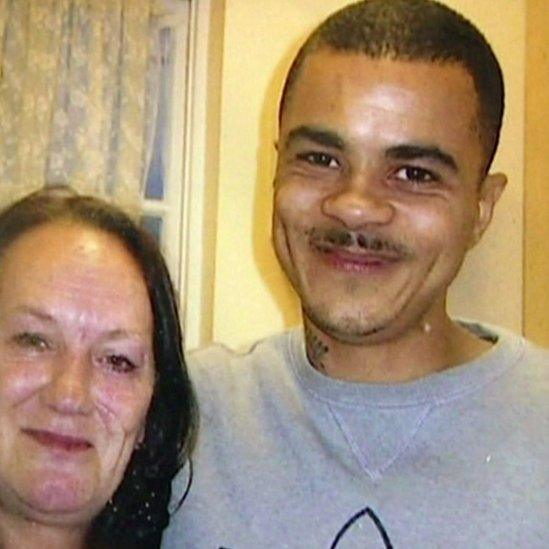
Mark Duggan, 29, is shot dead by police in Ferry Lane, Tottenham, at 18:15 BST.
The death happens during an operation where specialist firearm officers and officers from Operation Trident, the unit which deals with gun crime in the African and Caribbean communities, are attempting to carry out an arrest.
Mr Duggan is a passenger in a minicab. The Independent Police Complaints Commission (IPCC) announces it will investigate the incident and later says it believes two shots were fired by police. It also confirms that an illegal firearm was recovered from the scene.

Friday 5 August 2011
The IPCC appeals for witnesses to the shooting.

Saturday 6 August 2011
About 300 people gather outside Tottenham police station after marching from the Broadwater Farm estate. They say they want "justice" for Mr Duggan and his family.
Witnesses report that the protest begins peacefully.
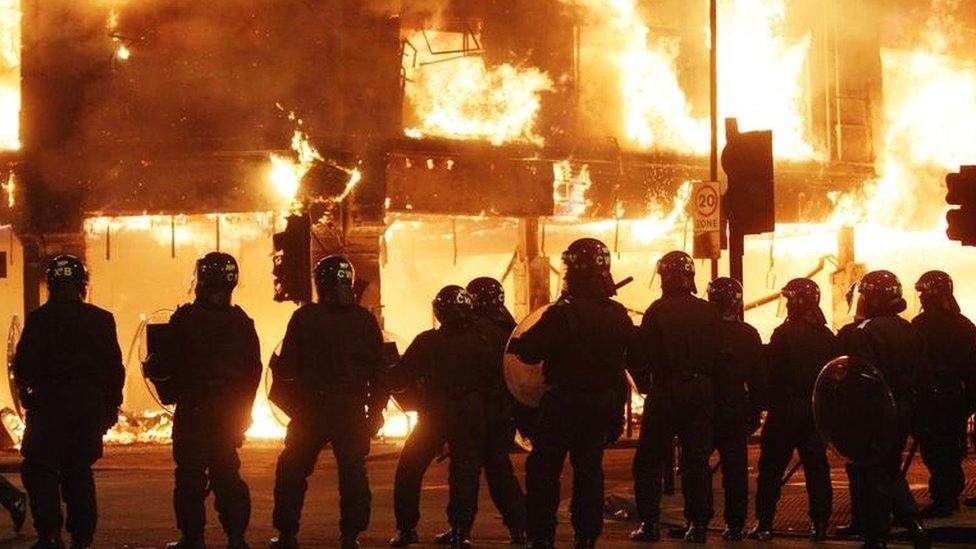
The rioting erupted following a peaceful protest
The violence begins as bottles are thrown at two patrol cars which are then set alight.
Unconfirmed reports say the incident was sparked by a confrontation between a teenage protester and a police officer.
Riot officers and police on horseback are deployed to disperse the crowds but come under attack from bottles, fireworks and other missiles.

Sunday 7 August 2011
The violence continues. Petrol bombs are thrown at police and buildings, while shops are set alight.
The London Fire Brigade says it has dealt with 49 fires in the Tottenham area by 04:30 BST and received more than 250 emergency calls from the public.
Police announce the launch of Operation Withern to investigate the riots.
Mr Duggan's family say they do not condone the rioting in Tottenham.
IPCC commissioner Rachel Cerfontyne says she is sorry if any members of Mr Duggan's family feel that they are not supported. She announces that she has set up a community reference group to make sure she is sensitive and responsive to the family.

Monday 8 August 2011
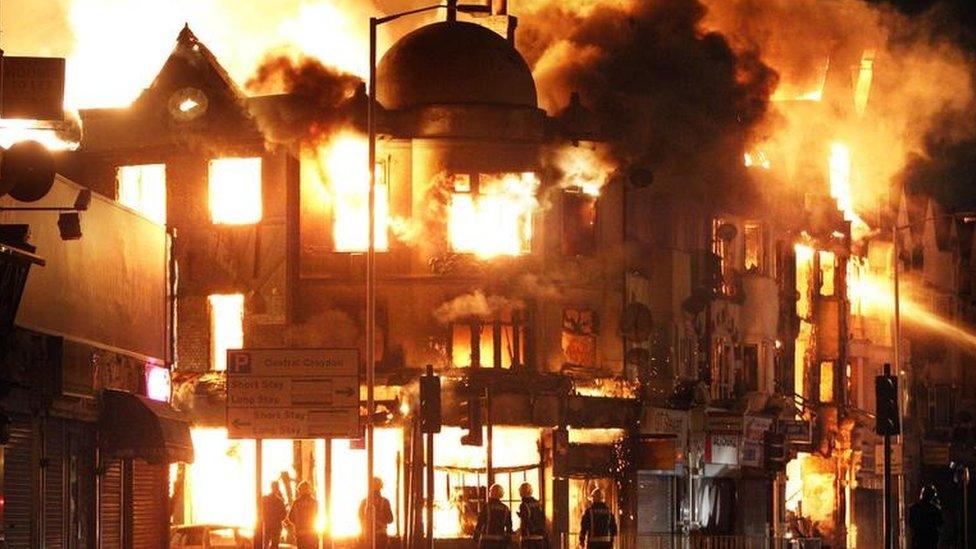
Reeve's Corner was destroyed as buildings and cars were set alight on the third night of violence
Claudia Webbe, who chairs Operation Trident's independent advisory group, questions why Mr Duggan's family had not been contacted sooner by the IPCC.
Rioting and looting continues for the third night in London affecting Croydon, Clapham, Hackney, Camden, Lewisham, Peckham, Newham, East Ham, Enfield, Woolwich, Ealing and Colliers Wood.
During the evening the riots claim two lives.
Trevor Ellis, 26, of Brixton Hill, south London, is found with bullet wounds in a car in Croydon, while Richard Bowes, 68, is critically injured when he tries to put out a fire during riots in London.
He later dies from his injuries.
Unrest spreads to other English cities, with Birmingham, Liverpool, Nottingham and Bristol also experiencing violence.

Tuesday 9 August 2011
The IPCC reveals that there is no evidence Mr Duggan opened fire at police, external before being shot dead by a firearms officer.
The police watchdog says ballistic tests showed "no evidence that the handgun found at the scene was fired".
Rachel Cerfontyne, IPCC commissioner: "The gun found at the scene was a converted... pistol"
MPs are recalled from their summer holidays in the wake of continued disorder across London and other English cities.

Wednesday 10 August 2011
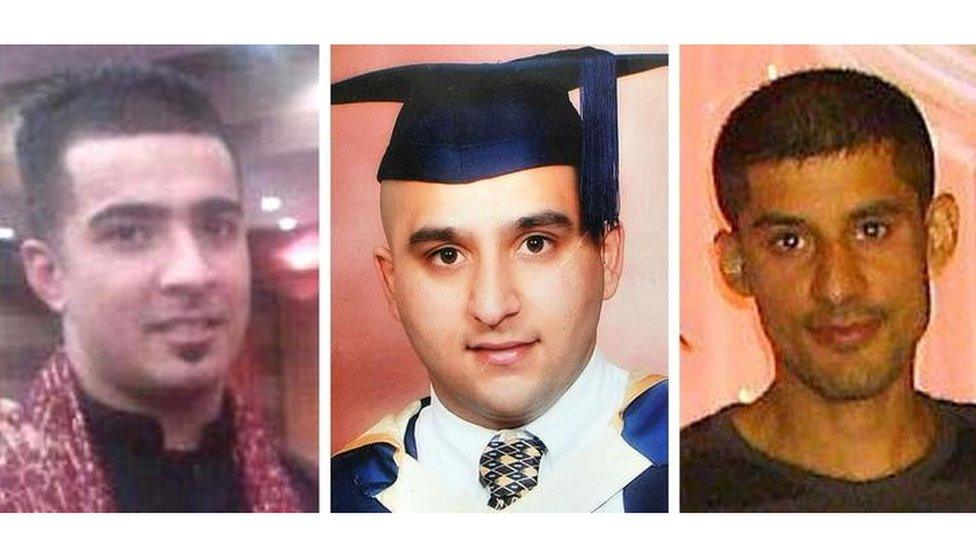
Haroon Jahan, Shazad Ali and Abdul Musavir died when they were hit by a car during the disorder
Haroon Jahan, 21, Shazad Ali, 30, and Abdul Musavir, 31, are killed when a car hits them in Winson Green, Birmingham.
Witnesses say the men were in a group protecting their community after riot police were called into the city.

Thursday 11 August 2011
The police watchdog appeals for witnesses to the fatal shooting of Mr Duggan.
Former Met deputy assistant commissioner Brian Paddick says the force could have stopped further rioting, external if it had responded properly to initial disturbances in Tottenham.

Friday 12 August 2011
The IPCC admits it may have misled journalists into believing Mr Duggan fired at officers before he was killed.

Wednesday 24 August 2011
Ken Hinds, a local gang mediator and family friend of Mr Duggan's girlfriend Simone Wilson, reveals he warned police explicitly about the risk of rioting at a meeting with them at lunchtime on Saturday, 6 August.

Thursday 8 September 2011
Mr Duggan's family say they have "no faith" in the IPCC investigation into his death.
His brother, Shaun Hall, adds: "I'm not confident at all. If the initial stages of this incident are anything to go by, I've got no trust in them whatsoever."

Friday 9 September 2011
A private funeral for Mr Duggan is held with a reception at the Broadwater Farm Community Centre.

5 October 2011
Mr Duggan's family say they will give the IPCC a chance to get the inquiry into his death "right".

25 October 2011
Mr Duggan was not "bad enough or mad enough" to draw a gun on police officers, a friend says.
The man whose shooting sparked the London riots was "not bad enough or mad enough" to draw a gun on police officers, a friend has said
Stafford Scott was among the activists who took part in the original march.

18 November 2011
The IPCC says it is to probe whether a gun recovered from the scene was used in a crime a week earlier.
Kevin Hutchinson-Foster, 29, is charged with possession of a firearm after allegedly assaulting a man in a hair salon in Hackney on 29 July.

19 December 2011
The policing operation to tackle the summer riots across England was flawed, a report from MPs concludes.
The perception that in some areas police had lost control of the streets was the most important reason disorder spread, they say.

29 February 2012
The IPCC upholds a complaint by Mr Duggan's family that they were not told he had been shot dead by officers.
Scotland Yard said it had apologised in September to Mr Duggan's parents for not telling them directly about his death.
IPCC Commissioner Rachel Cerfontyne: "What is clear from this case is that a grieving family, suffering from shock, felt badly treated"

27 March 2012
A lack of support and opportunity for young people contributed to the outbreak of riots in England last summer, an independent report, external says.
The Riots, Communities and Victims Panel, set up last year, highlights "500,000 forgotten families".

29 March 2012
Carole Duggan: I'd prefer to know the truth
The Met supports calls for changes to the law to allow more details to be revealed in cases where the police have shot people.
Mr Duggan's aunt Carole said she wanted an inquest to be held as she "preferred to know the truth - whether it is good or bad".

26 April 2012
The BBC obtains footage of the aftermath of the police shooting.
Exclusive footage obtained by the BBC shows the aftermath of Mark Duggan's shooting
It was taken by someone who says they witnessed the shooting and shows attempts to save Mr Duggan's life.

4 August 2012
Pam Duggan: This family doesn't believe in violence
Mr Duggan's mother Pam says the year since her son's death had "been terrible - we still have no answers about why my son died".
She said: "The police haven't told me anything. They apologised for not coming to tell me, not for what they did."

6 August 2012
Local traders in Tottenham have struggled to get compensation for businesses damaged during the riots
Prison sentences totalling more than 1,800 years have been handed out to rioters following the disorder which began exactly a year ago.

18 September 2012 - 17 October 2012
The trial of Hutchinson-Foster, accused of giving Mr Duggan the gun, is held at Snaresbrook Crown Court.
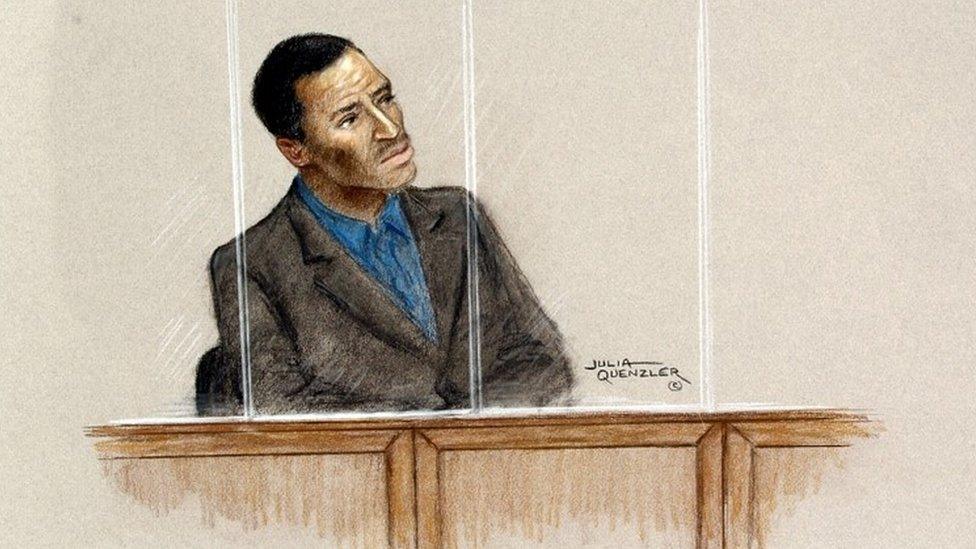
Kevin Hutchinson-Foster was on trial for giving Mark Duggan a gun
The court hears he gave Mr Duggan the gun 15 minutes before he was shot.
Mr Duggan "pulled a gun from his waistband", the court hears, and Mr Duggan and Hutchinson-Foster were in contact via mobile phone calls and text messages minutes before he was shot.
The police officer who shot Mr Duggan, V53, says he is "absolutely 100%" sure he was holding a gun.
After a month-long trial, the jury is unable to reach a verdict.

28 January 2013
A date for the public inquest is set for September.
The pre-inquest hearing is told a judge will act as coroner because sensitive material is involved in the case.

31 January 2013
A jury in a retrial finds Hutchinson-Foster guilty of supplying the gun - a BBM Bruni Model 92 handgun - to Mr Duggan.

26 February 2013
Kevin Hutchinson-Foster has been jailed for 11 years
Thirty-year-old Hutchinson-Foster is jailed for 11 years.
Judge David Radford says Hutchinson-Foster had "plainly known" the gun would be used for criminal purposes by Mr Duggan or somebody else.

18 June 2013
Mr Duggan's family have an application for a judicial review into police protocol rejected.
They wanted procedures, designed to protect officers collaborating on incident reports, looked at but the High Court ruled it was not appropriate for the court to prescribe such rules.

16 September 2013 - 11 December 2013
The inquest into Mr Duggan's death begins.
Jurors are told they must decide on whether he was lawfully killed.
The BBC's Mark Prodger was in court as Pamela Duggan said: "He should have been brought to justice and punished, he should not have been shot and killed"
Over the next few months, the jury hears Mr Duggan was "among Europe's most violent criminals". However, his mother says her son "may not have been an angel" but he should not have been shot dead by police.
A firearms commander says it is "absolutely outrageous" to suggest he planted a gun found nearby while the police officer who fired the shots says he saw him holding the handgun and believed he was going to shoot.
Speaking via videolink from prison, Hutchinson-Foster tells the inquest he will appeal against his conviction once the inquest is completed.
The court is also told Mr Duggan may have "flicked the gun" over the fence while a witness says they saw an officer run "from the scene with an object" and a different witness says Mr Duggan "was surrendering" and holding a phone when he was shot.

11 December 2013 - 7 January 2014
On 11 December 2013, the jury retires to consider its verdict, being told it must reach a unanimous conclusion. On 18 December, the jury is by told by the judge that a majority conclusion will now be acceptable.
Judge Keith Cutler says the law "allows me to accept a majority decision on any of the determinations or the conclusion of which at least eight out of the 10 of you are agreed".

8 January 2014
The inquest jury concludes by a majority of 8 to 2 that Mr Duggan was lawfully killed by police., prompting angry reaction from his family's supporters outside the court.
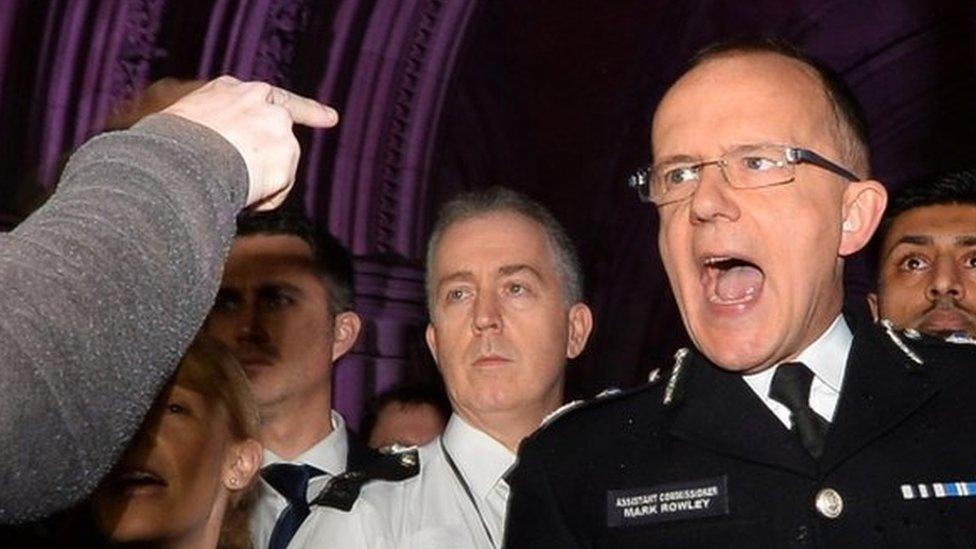
Assistant Commissioner Mark Rowley was heckled as he attempted to read a statement outside court after the inquest
The panel of seven women and three men was asked to answer five questions:
In the period between midday on 3 August 2011 and when state amber was called at 6.00 pm on 4 August 2011, did the Metropolitan Police Service and the Serious Organised Crime Agency do the best they realistically could have done to gather and react to intelligence about the possibility of Mr Duggan collecting a gun from Mr Hutchinson-Foster? The jury unanimously concluded no.
Was the stop conducted in a location and in a way which minimised, to the greatest extent possible, recourse to lethal force? Unanimous yes.
Did Mr Duggan have the gun with him in the taxi immediately before the stop? Unanimous yes
How did the gun get to the grass area where it was later found? A majority of 9 to 1 said it was thrown.
When Mr Duggan received a fatal shot, did he have the gun in his hand? A majority of 8 to 2 said no, he did not have a gun in his hand.

14 October 2014
The verdict of lawful killing is upheld by three High Court judges following an appeal by Mr Duggan's mother, Pamela Duggan.
Sir Brian Leveson, president of the Queen's Bench Division, who heard the case with Mr Justice Burnett and Judge Peter Thornton QC, said the court "recognised the tragedy" of the loss of Mr Duggan's life - but ruled that none of the grounds of challenge had been established.

27 October 2015
Mark Duggan's family win the right to launch a judicial review into the inquest's finding that he was lawfully killed, after challenging the 2014 High Court ruling.
Lord Justice Sales allowed their application for permission to appeal, but warned the family against thinking his decision meant they would succeed.
But he added that "the shooting dead of a suspect by police is always a matter for careful scrutiny".